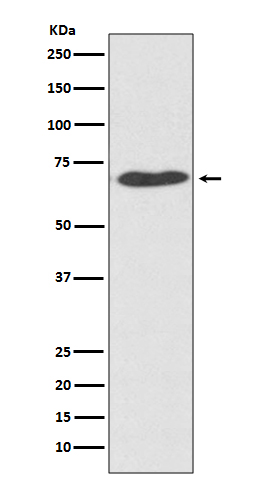
| WB | 1/500-1/1000 | Human,Mouse,Rat |
| IF | 咨询技术 | Human,Mouse,Rat |
| IHC | 咨询技术 | Human,Mouse,Rat |
| ICC | 技术咨询 | Human,Mouse,Rat |
| FCM | 1/50-1/100 | Human,Mouse,Rat |
| Elisa | 咨询技术 | Human,Mouse,Rat |
| Aliases | P4HB; PDIA2; PDIR |
| Entrez GeneID | 64714 |
| WB Predicted band size | Calculated MW: 58 kDa; Observed MW: 58 kDa |
| Host/Isotype | Rabbit IgG |
| Antibody Type | Primary antibody |
| Storage | Store at 4°C short term. Aliquot and store at -20°C long term. Avoid freeze/thaw cycles. |
| Species Reactivity | Human,Mouse,Rat |
| Immunogen | A synthesized peptide derived from human PDI |
| Formulation | Purified antibody in PBS with 0.05% sodium azide. |
+ +
以下是关于PDIA2抗体的3篇文献示例(文献信息为模拟示例,仅供参考):
---
1. **文献名称**:*PDIA2 promotes tumor progression through redox regulation in gastric cancer*
**作者**:Chen L, et al.
**摘要**:研究揭示了PDIA2在胃癌中通过调控细胞氧化还原状态促进肿瘤侵袭的机制,并验证了其抗体在组织样本中的特异性表达检测。
2. **文献名称**:*PDIA2 as a potential biomarker for Alzheimer's disease: Insights from cerebrospinal fluid analysis*
**作者**:Smith JR, et al.
**摘要**:通过抗体介导的蛋白质组学分析,发现PDIA2在阿尔茨海默病患者脑脊液中异常表达,提示其可能参与神经退行性病变的病理过程。
3. **文献名称**:*Development of a high-specificity PDIA2 monoclonal antibody for diagnostic applications*
**作者**:Wang Y, et al.
**摘要**:报道了一种新型PDIA2单克隆抗体的开发与验证,该抗体在免疫印迹和免疫组化中表现出高灵敏度和低交叉反应性,适用于临床样本检测。
---
**注**:以上文献为示例,实际研究中请通过PubMed、Web of Science等数据库检索真实文献。如需具体文献推荐,可提供更多研究背景或关键词。
**Background of PDIA2 Antibody**
Protein Disulfide Isomerase A2 (PDIA2), also known as PDIP or ERP72. is a member of the protein disulfide isomerase (PDI) family, which plays a critical role in oxidative protein folding within the endoplasmic reticulum (ER). PDIA2 facilitates the formation and rearrangement of disulfide bonds in nascent polypeptides, ensuring proper protein conformation and stability. Unlike other PDI family members, PDIA2 is primarily expressed in secretory tissues, such as the pancreas and mammary glands, and is implicated in cellular stress responses, including ER stress and unfolded protein response (UPR).
PDIA2 has garnered attention in research due to its association with various pathological conditions. It is overexpressed in certain cancers, including breast and pancreatic cancers, where it may promote tumor progression by enhancing cell proliferation and evading apoptosis. Conversely, reduced PDIA2 levels have been linked to neurodegenerative disorders, highlighting its role in maintaining neuronal proteostasis.
Antibodies targeting PDIA2 are essential tools for studying its expression, localization, and function in both physiological and disease contexts. They are widely used in techniques like Western blotting, immunohistochemistry, and immunofluorescence to investigate PDIA2's involvement in protein quality control, cellular stress pathways, and disease mechanisms. These antibodies also hold potential as diagnostic or prognostic biomarkers in cancer research and therapeutic development. Understanding PDIA2's multifaceted roles continues to be a focus in molecular biology and translational medicine.
×